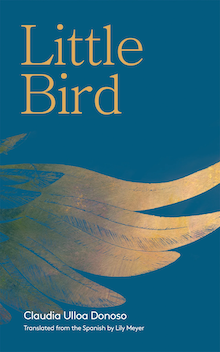
Deep Vellum, 2021
Little Bird is a book of tiny, fabulous adventures. Its narrators — mostly women who seem estranged from themselves — tell stories as if from the middle of a tightrope strung between small buildings. Anything can happen: One woman goes to a job interview with a wounded bird in her coat pocket; another meets a man who speaks a language she does not understand, listens to his story, takes him home, and finally accepts an engagement ring from him.
Even though this book did not have characters with whom I could spend extended time or an intricate plotline to get involved in, I devoured it. Or, at least, I devoured it in the beginning. Halfway through, I slowed down to savor.
Why did I find it so compelling? I suppose the fascination stemmed, in part, from the strange predilections of the characters. There is a husband who insists that his wife spend every afternoon with him in the closet; while he lays on his side “surrounded by his gorgeous dress shirts,” and she stretches out with “all my dresses and perfumes around me.” Most of the narrators are women, and there is a certain slyness about them. In a story of one page, a hotel receptionist declares that she feels like a puppet manipulated by her boss and by the guests. She then turns the tables on them all, by becoming a puppeteer and transforming her boss and guests into her puppets, and leaving us to wonder what has really happened.
Donoso’s stories take various forms. One includes a long list of adjectives beginning with “D,” while others consist of a page of dialogue. There are some delicious sentences. Try: “I waited for myself in a hotel room in Oslo.” Or: “The last woman I loved was 70% water.” The longest story is three pages long, yet each piece in the collection evokes a world to get lost in.
There is a story behind the book. Donoso, who lives in Norway above the Arctic Circle, could not sleep due to the summertime midnight sun. She began a blog about insomnia, and the stories in Little Bird grew out of that blog. The back cover describes Donoso’s work as “a sharpshooting combination of George Saunders and Samanta Schweblin.” To that list I would add Laura van den Berg, whose narrators do similarly strange and impulsive things. In van den Berg’s stories, there is always an emotional urgency, an alienation, underlying the random-seeming actions of the characters; reading Donoso’s book brought me into similar territory.
The translator’s note is well worth reading. Lily Meyer writes of Donoso that “her stories feel wildly inventive while winking constantly at the irrationality of invention.” Perhaps that sentence captures best the playfulness of these stories. They are the textual equivalent of wandering into a Remedios Varo painting or joining a treasure hunt in a surrealist playground in the middle of the night. They inspire sheer delight.
+++
+
+